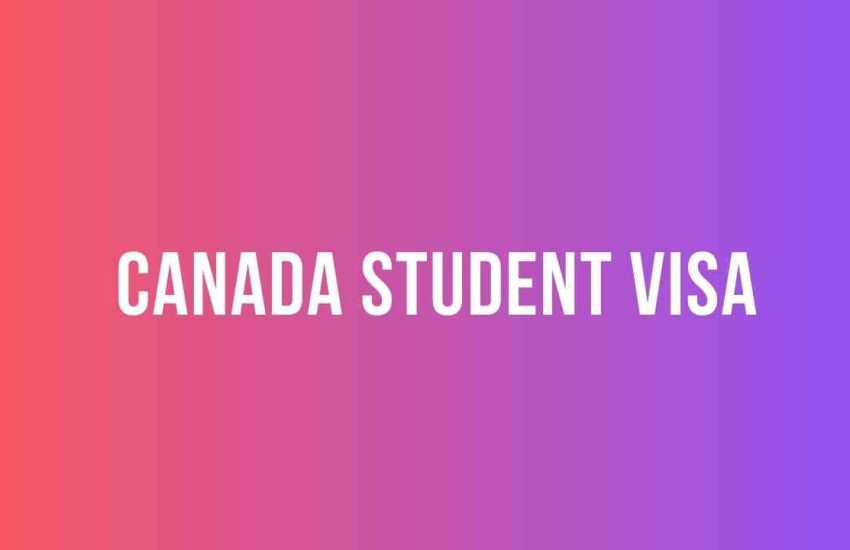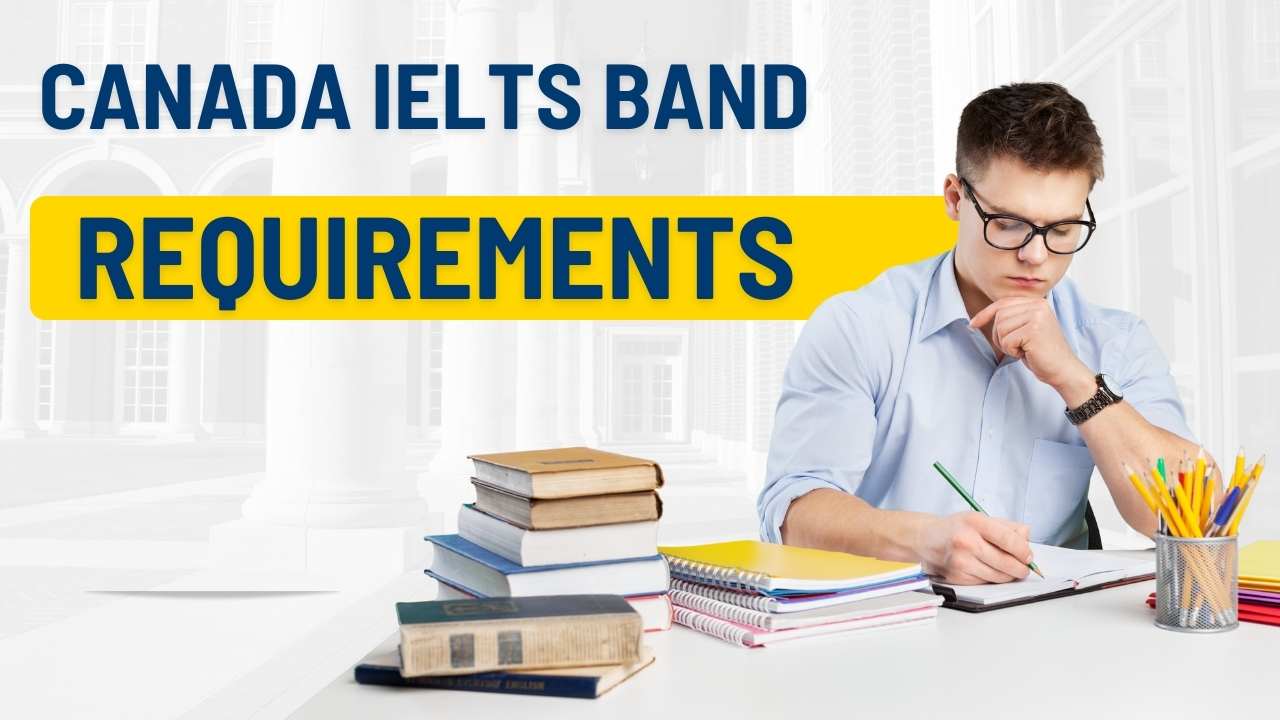Canada, known for its scenic beauty and vibrant culture, has emerged as a popular destination for students seeking quality education. With its highly developed educational system and globally recognized degrees, Canada attracts a large number of international students. However, to study in Canada, students must obtain a student visa and study permit. This article provides detailed information about the student visa process and the requirements for obtaining a study permit in Canada.
Read Also: Best Canadian Scholarships for International Students
What is a Canada Student Visa?
A Canada Student Visa, also known as a study permit, grants permission to individuals to pursue their studies in Canada. The student visa is a combination of either a visitor visa or an Electronic Travel Authorization (eTA) along with a study permit. It allows students to enroll in Designated Learning Institutions (DLIs) in Canada. A study permit not only enables students to study in Canada but also permits them to work during their studies and in some cases, after graduation. To maintain a valid student visa, certain conditions must be met:
- Enroll in a Designated Learning Institution (DLI) throughout the study period.
- Make satisfactory progress towards completing the study program.
- Meet all the requirements of the student visa.
- Cease studies if the requirements of the student visa are not met.
- Leave Canada immediately upon the expiry of the study permit.
It is important to note that a study permit does not entitle students to receive Canadian government benefits or documents issued by the Canadian government, such as health benefits. However, it may serve as a stepping stone towards applying for Canadian citizenship in the future.
Read Also: Top 10 Jobs Foreign Students Can Do In Canada
What is a Designated Learning Institution?
A Designated Learning Institution (DLI) is an educational institution approved by the provincial or territorial government to host international students. While all primary and secondary schools in Canada are automatically considered DLIs, not all universities and educational institutions hold this designation. It is crucial to verify the DLI status of an institution before applying for admission. The Government of Canada’s official website provides a tool to check if an institution is a DLI by selecting the province or territory of interest. Attending an institution that loses its DLI status does not affect the student’s study permit until its expiry. However, if the study permit expires before completing the program, students must enrol in a new DLI to obtain a new study permit.
Who Needs a Canadian Study Permit?
International students who require a visitor visa or eTA to enter Canada must obtain a study permit to study in Canada. However, there are certain exceptions where a study permit may not be required:
- Short-term programs: If the study program lasts less than 6 months, a study permit is not mandatory. However, it is important to ensure the program can be completed within the specified timeframe. If it exceeds 6 months, a study permit is necessary.
- Family or staff members of foreign representatives: Individuals who are family members or staff members of foreign representatives accredited by Global Affairs Canada are exempt from the study permit requirement.
- Foreign armed forces members: Members of foreign armed forces on official duties in Canada do not need a study permit, although their family members may require one.
- Registered Indian Status: Individuals who are citizens of another country but hold a Registered Indian Status in Canada are exempt from the study permit requirement.
- Minor children: Minor children in Canada may not need a study permit if they fall under the following categories:
- Kindergarten students
- Refugees or refugee claimants
- Children of refugee or refugee claimant parents
- Primary or secondary school students with parents authorized to work or study in Canada
Do I Qualify for a Canada Student Visa?
To be eligible for a Canada Student visa and study permit, the following criteria must be met:
- Acceptance letter from a Designated Learning Institution (DLI): Obtain an official acceptance letter from a DLI that includes essential information such as the institution’s official letterhead, program details, tuition fees, and program start and end dates.
- Age requirements: The primary student visa applicant must be at least 18 years old. Children under 18 years old cannot apply alone; their parents or legal guardians must apply on their behalf.
- Clean criminal history: Provide court documents to demonstrate a clean criminal record.
- Visa Application Center (VAC) Consent Form: Fill out and sign the VAC Consent Form.
- Proof of current immigration status: Submit copies of current immigration status in another country or in Canada.
- Temporary stay in Canada: Provide evidence that the stay in Canada is temporary and that the intention is to return to the home country upon completion of studies.
Canada Student Visa Requirements
In addition to completing the necessary forms, the following supporting documents must be submitted when applying for a Canada Student Visa:
- Valid passport: Provide a scanned copy of a valid passport.
- Travel history: Submit scanned copies of the entire passport to demonstrate travel history and availability of blank pages.
- Court and police documents: Letters from the court and police in the applicant’s home country to confirm a clean criminal record.
- Declaration Letter: Write a letter addressed to the Government of Canada explaining the reasons for requesting a visa and study permit.
- Passport-sized photos: Include two photos that meet the Canada Photo Requirements.
- Medical examinations: Undergo any required medical examinations.
- Employment or education status: Provide a resume or copies of diplomas to demonstrate employment or education status.
- Proof of financial capability: Show proof of funds to cover tuition and living expenses. Acceptable forms of proof include:
- Proof of a Canadian bank account in the applicant’s name.
- Guaranteed Investment Certificate (GIC) issued by a Canadian financial institution.
- Student loan documentation.
- Bank statements for the past four months.
- Proof of tuition and housing fee payment.
- Letter of financial support from a person or institution.
- Scholarship documentation.
- Certificat d’acceptation du Quebec (CAQ) (if applicable): Students planning to study in Quebec must submit a CAQ issued by the Quebec government. The school will provide instructions on how to apply for a CAQ.
- Letter of explanation: Submit a letter explaining the motivation to study in Canada and acknowledging the responsibilities as a student.
- Custodian Declaration Form (if applicable): If a minor child requires a custodian who is not their parent, a Custodian Declaration Form signed by the parents or legal guardians must be submitted.
- Unique Client Identifier (UCI) (if applicable): First-time applicants do not require a UCI, but those who have previously applied for a study permit must provide their UCI number, which can be found in correspondence from the Canadian Government.
- Family application: If family members (spouse or common-law partner and minor children) are accompanying the student, separate application forms must be completed for each family member.
All documents must be translated into English or French, and certified translations must be provided. Once all documents are prepared, the application can be submitted along with the required fees.
Minimum Financial Requirements for a Canada Study Visa
To obtain a student visa or study permit, applicants must demonstrate sufficient funds to cover their tuition fees and living expenses in Canada. The financial requirements vary depending on whether the student is studying outside or inside Quebec
. The following table outlines the minimum funds required:
Students studying outside of Quebec:
| Persons coming to Canada | Amount of funds required per year (in addition to tuition) | Amount of funds required per month (in addition to tuition) |
|---|---|---|
| You (Student) | $10,000 | $833 |
| First family member | $4,000 | $333 |
| Every additional family member accompanying you | $3,000 | $255 |
Students studying in Quebec:
| Persons coming to Canada | Amount of funds required per year (in addition to tuition) | Amount of funds required per month (in addition to tuition) |
|---|---|---|
| You (Student) | $11,000 | $917 |
| First family member (18 years old or older) | $5,100 | $425 |
| First family member (under 18 years old) | $3,800 | $317 |
| Every additional family member accompanying you (18 years or older) | $5,125 | $427 |
| Every additional family member accompanying you (under 18 years old) | $1,903 | $159 |
How to Apply for a Canada Student Visa?
Follow these steps to apply for a Canada student visa as a third-country national:
Register online for your application:
All visa applications must be submitted online through the official immigration website of the Government of Canada. Create an account using a valid email address and follow the instructions provided during the application process.
Prepare the required documents:
Gather all the necessary documents for your student visa application. It is crucial to consult with the Canadian embassy or consulate in your country to ensure you have the correct and certified translations of the documents.
Fill out the application form:
Complete the application form along with any additional forms required. These forms can be obtained from the Canadian embassy or consulate in your country. Double-check the accuracy of the information provided and sign the application form.
Pay the required visa fee:
Submit the applicable visa fee payment. The fees include processing fees and biometric fees. Payment is made online through the designated online payment gateway. After completing the payment, retain a printed receipt and attach a copy to your application.
Submit your application:
Scan and submit all required documents through your online account on the immigration website. The system will verify that all necessary documents have been provided and that the visa fee has been paid. If any documents are missing or incorrect, the system will return the application for completion.
Other Ways to Apply for a Canada Student Visa
In certain cases, individuals can apply for a Canada student visa through alternative methods based on their nationality or circumstances. These methods include:
- Applying for a student visa from inside Canada: Specific categories of applicants can apply for a student visa from within Canada, but the application process must still be completed online.
- Applying for a student visa from the port of entry (POE): Eligible individuals can apply for a student visa directly at the Canadian port of entry. However, specific criteria must be met, such as being a Ukrainian citizen or a family member of a Ukrainian citizen.
Can I Apply for a Student Visa In Person?
Certain categories of applicants have the option to apply for a Canada student visa in person. These categories include individuals with disabilities preventing online application and individuals possessing travel or identity documents issued to non-national residents, refugees, or stateless persons. In-person applications can be submitted at a Canadian embassy or consulate in the applicant’s country of citizenship, an embassy outsourcing visa processing to Canada, or a visa application center.
What is the Cost of the Canada Student Visa?
The application process for a Canada Student Visa involves paying various fees, including the application fee and biometric fee. The fees must be paid per person, and all family members applying must pay their respective fees. It is important to note that fees are non-refundable, regardless of the outcome of the visa application. The current fees are as follows:
- Application fee: CAD $150 per person.
- Biometrics fee: CAD $85 per person.
- Biometrics fee for a family (2 or more applicants): CAD $170.
- Maximum total fee for families applying together: CAD $170.
How long is the Canadian Student Visa valid?
A Canadian student visa is valid for the duration of the study program, along with an additional 90 days. These 90 days allow students to prepare for their departure from Canada or to apply for an extension of their study permit. If the study program is not completed within the validity period of the study permit, an extension must be obtained. If the program is completed before the study permit’s expiry date, an additional 90-day period is granted for preparation to leave Canada.
Proof of program completion must be provided, such as an email, letter, or official document from the educational institution indicating graduation. The date of issuance of the completion document will be considered the program completion date, marking the beginning of the additional 90-day period.
Can I Visit My Home Country with a Canada Student Visa?
Students with a valid Canada student visa can travel to their home country during school breaks. However, upon re-entry to Canada, they must present valid documentation, including a valid visa or eTA and the study permit. If the visa or eTA is no longer valid, entry into Canada will not be permitted. It is essential to ensure that all required documents are valid before traveling outside Canada. Extensions should be applied for before traveling if necessary.
Can I Change Schools with a Canada Student Visa?
The holder of a Canada student visa can change schools while studying in Canada, provided they meet the visa requirements. It is mandatory to notify the Canadian government when changing schools in the following situations:
- Transition from primary school to high school.
- Transition from high school to post-secondary school.
- Change of institution within post-secondary education, including universities, community colleges, private universities, academies, career colleges, training institutions, and language training courses.
- Any changes to the conditions specified in the study permit.
In such cases, a new study permit must be
obtained. The application process for a new study permit must be followed, and the permit will be specific to the new school.
No notification to the Canadian government is required when changing schools in the following situations:
- Changing schools at the same educational level (e.g., from one primary school to another).
- Changing study programs within the same institution.
- Enrolling in a study program lasting 6 months or less.
Can My Family Members Accompany Me to Canada?
Spouses, common-law partners, and minor children of international students can accompany them to Canada. However, family members must apply for their own visas, which will be visitor visas, not study permits. It is advisable to submit the applications together, indicating the family’s desire to stay together during the study period.
Can I Work While on a Student Visa?
International students with a Canada student visa may be eligible to work under certain conditions. These conditions are in place to prevent individuals from obtaining student status solely for the purpose of working without attending classes or completing their degrees. The following work options are available:
- On-campus work: Permitted for students enrolled in full-time programs.
- Co-ops or internships: Allowed if required as part of the program curriculum.
- Off-campus work: Allowed if the study permit explicitly permits it, with a maximum of 20 hours per week.
Each option has additional requirements and conditions specific to the student’s situation. It is crucial to consult the Government of Canada and refer to the relevant guidelines for comprehensive details on working while on a student visa in Canada.
Can I Work After Completing My Studies?
Students who wish to work in Canada after completing their educational degree can apply for a Post-Graduate Work Permit (PGWP) while holding a student visa. The duration of the PGWP depends on the length of the study program:
- Programs less than 8 months: Not eligible for a PGWP.
- Programs between 8 months and 2 years: Eligible for a PGWP valid for the same length as the study program.
- Programs of two or more years: Eligible for a PGWP valid for 3 years.
- Multiple study programs completed: Eligible for a PGWP of up to 3 years.
This allows students to gain valuable work experience in Canada after completing their studies.
Obtaining a student visa and study permit is essential for international students planning to study in Canada. By understanding the application process, meeting the requirements, and providing the necessary documentation, students can pursue their educational goals in one of the world’s most attractive destinations. Remember to consult the official Government of Canada website and seek guidance from the appropriate authorities for the most accurate and up-to-date information regarding student visas and study permits in Canada.



